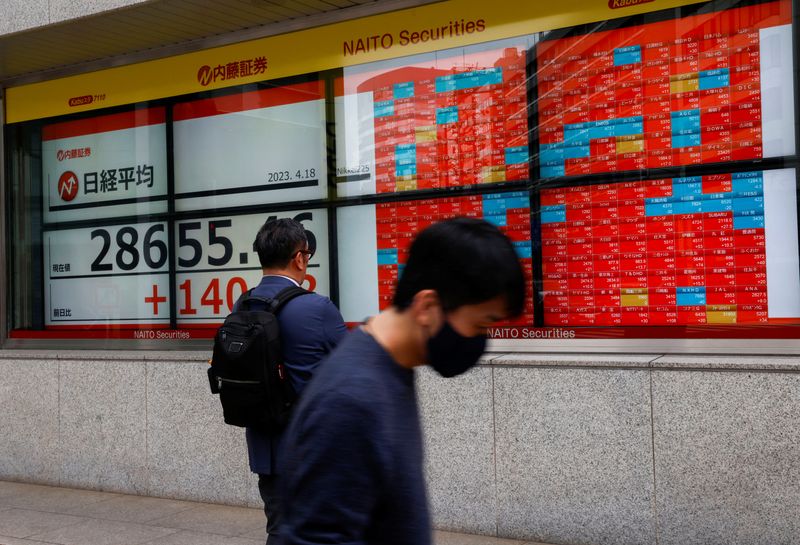Select Language

By Stella Qiu
SYDNEY (Reuters) - Asian shares were set for their worst month since February, with sentiment hurt by still-gloomy China factory readings on Thursday, as investors awaited a barrage of U.S. data that could add to bets that interest rates have peaked.
Europe is likely to open in a subdued manner, with EUROSTOXX 50 futures up a slight 0.1%. Both S&P 500 futures and Nasdaq futures were little changed.
In Asia, MSCI's broadest index of Asia-Pacific shares outside Japan slipped 0.3% and was headed for a monthly loss of 6.3%, the largest since February. Japan's Nikkei, however, gained 1%.
Data on Thursday showed China's manufacturing activity contracted for a fifth straight month in August, but the pace of declines moderated, while the expansion in services sector lost a little momentum.
"The latest official PMI data were not uniformly bad," said Robert Carnell, head of research, Asia-Pacific, at ING.
"Both series (manufacturing and services) seem to be converging on a point close to 50 consistent with an economy that is neither expanding nor contracting. Things could be worse. But markets are not likely to take too much comfort from this set of data."
Chinese blue-chips fell 0.6% while Hong Kong's Hang Seng Index gave up earlier gains to be off 0.5%, weighed by a 1.8% drop in property developers.
Shares in Baidu (NASDAQ:BIDU) and SenseTime gained 3.1% and 2.6%, respectively, as they launched artificial intelligence (AI) chatbots to the public after obtaining government approval.
China's largest private property developer Country Garden warned of default risks if its financial performance continues to deteriorate, fuelling concerns that piecemeal support measures from Chinese authorities are not enough to engineer a turnaround in a critical sector.
Despite the China gloom, the investor mood perked up in August, with a global confidence index (ICI) from State Street (NYSE:STT) Global Markets surging 11.4 points to 107.7, led by North America which recorded the strongest reading in a year on easing recession fears.
Overnight, Wall Street rose after a slew of U.S. economic indicators generally surprised to the downside, adding to bets that the Federal Reserve is done tightening and rate cuts next year could amount to more than 100 basis points.
Private payrolls clocked a 52.3% monthly drop, adding to signs of a softening in the labour market, while second-quarter GDP was revised lower.
Attention now turns to inflation numbers as measured by the U.S. personal consumption expenditures (PCE) on Thursday - the Federal Reserve's preferred gauge of inflation - and non-farm payrolls on Friday.
Action in the Treasuries market was muted after a brutal sell-off earlier this month. Ten-year yields held at 4.1140%, having steadied in the past few sessions. They were nonetheless 16 basis points higher in August.
Two-year yields stood at 4.8899% on Thursday, after briefly dipping to a three-week low of 4.8360% overnight.
There was, however, less cheer in Europe on the inflation front. Annual inflation in Germany and Spain barely slowed in August, against expectations, raising the stakes for the euro zone inflation numbers later in the day.
Bets that the European Central Bank will have to hike in September saw the euro surge on the yen, hitting a 15-year high of 159.76 yen overnight. It last hovered at 159.4 yen on Thursday.
Oil prices were mostly flat. Brent crude futures were little changed at $85.90 per barrel and U.S. West Texas Intermediate crude futures were steady at $81.67.
The gold price was slightly higher at $1,945.49 per ounce.

